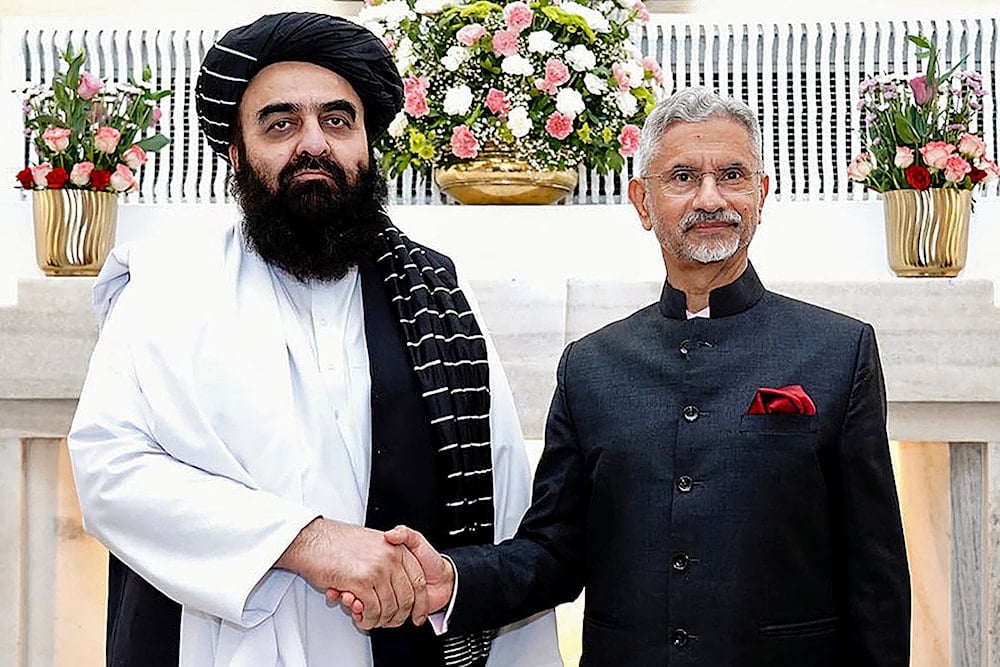Delhi hosting Taliban FM point at India’s pragmatic shift vs Pakistan
India’s decision to host Taliban Foreign Minister Amir Khan Muttaqi reflects a strategic pivot aimed at countering Pakistan's growing influence, TIME magazine says.
-

India's Foreign Minister Subrahmanyam Jaishankar (R) and his Afghan counterpart Amir Khan Muttaqi are seen here shaking hands during a bilateral meeting in New Delhi. (AFP)
A series of geopolitical developments, including the recent border clashes between Pakistan and Afghanistan, growing Chinese support for Pakistan, a cooling relationship with Russia, and Washington’s renewed embrace of Pakistan, have left India increasingly isolated in its immediate neighborhood, according to TIME magazine.
In this context, Afghanistan has become strategically significant for New Delhi. With the Taliban now asserting independence from Pakistan, Indian policymakers see an opportunity to regain lost influence in Central and South Asia.
"In short, Delhi and Kabul are thinking that 'the enemy’s enemy is a friend,' while Islamabad sees a strategic partnership between countries on its flanks as detrimental to its interests," according to TIME.
On one hand, New Delhi wants to work with whoever holds power, whether in Kabul or elsewhere, the magazine reported. This is evident in its alliance with the military junta in Myanmar, and its ongoing relations with both Iran and "Israel," as well as Russia and Ukraine. On the other, the Taliban is eager to strengthen ties with India as part of a broader effort to replace its reliance on Pakistan and counter Islamabad’s growing hostility.
Kabul’s leadership sees engagement with New Delhi as a means to hedge against its deteriorating relationship with its former patron, TIME wrote. The Taliban is also seeking to gain formal international recognition as Afghanistan’s legitimate government. By aligning more closely with India, the Taliban aims to diversify its diplomatic partnerships and reinforce its independence from Pakistani influence.
Read more: Trump hosts Pakistan army chief, claims he stopped India-Pakistan war
India hosts Afghan foreign minister
India recently hosted Afghanistan’s Taliban Foreign Minister, Amir Khan Muttaqi, for an official week-long visit, the first by a senior Taliban leader since the movement’s return to power in Kabul in 2021.
Muttaqi, who remains under United Nations sanctions, arrived in New Delhi after receiving a temporary travel exemption from the UN Security Council. During the visit, he held multiple meetings with Indian officials, including Foreign Minister Subrahmanyam Jaishankar, and addressed journalists from the premises of the Afghan embassy in New Delhi, which is still operated by diplomats from the previous, Western-backed administration.
Despite this unconventional arrangement, India publicly referred to Muttaqi as Afghanistan’s “foreign minister,” a symbolic but highly consequential gesture, widely seen as the clearest sign yet of New Delhi’s readiness to move toward normalizing ties with the Taliban-led government. So far, Russia remains the only major power to have formally recognized the Taliban administration, while other nations, including China and Iran, maintain pragmatic working relations without extending official recognition.
Read more: Taliban warns of ISIS-K training camps in Pakistan hosting Europeans
A new pragmatism in New Delhi’s foreign policy
The Indian Foreign Ministry also announced plans to upgrade its “technical mission” in Kabul into a full embassy, signaling a clear policy shift.
For decades, the Taliban evoked bitter memories in India, from their alleged complicity in the 1999 hijacking of an Indian Airlines flight to the 2008 bombing of the Indian embassy in Kabul that killed several Indian nationals. Yet, today’s outreach reflects a pragmatic recalibration of India’s foreign policy priorities.
Muttaqi’s visit coincided with deadly clashes along the Durand Line separating Pakistan and Afghanistan, a border dispute that has reignited tensions between Islamabad and the Taliban. The timing underscored the growing rift between the two and highlighted Muttaqi's visit to India as a potential trigger.
Pakistan has long sought to exert influence over the Taliban, whom it supported during their rise to power in the 1990s. However, relations between the two sides have deteriorated in recent months, with Islamabad accusing the Taliban of harboring the Tehrik-e-Taliban Pakistan (TTP), a group responsible for a string of attacks on Pakistani soil.
By hosting Muttaqi, India may have deepened the diplomatic rupture between Islamabad and Kabul, a development that is already reshaping the balance of power in South Asia for years to come.
Read more: Pakistan blames India after Taliban claim strikes hit Kabul, Paktika

 4 Min Read
4 Min Read








